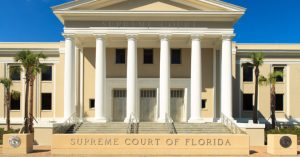Proving Constructive Knowledge in a Florida Slip-and-Fall Lawsuit
 Guests who are injured on someone else’s property may have the option of filing a claim to be compensated for injuries by the property owner. These are a type of premises liability claims, and one example is if a patron at a grocery store is injured in a slip-and-fall accident on a “transitory foreign substance”. To prevail in a Florida slip-and-fall lawsuit, F.S. 768.0755 requires the plaintiff’s needs to show the defendant property owner/manager had either actual or constructive knowledge of the slipping hazard. A “transitory foreign substance” was defined by the Supreme Court of Florida as “any liquid or solid substance, item or object located where it does not belong.” Owens v. Publix Supermarkets, Inc., 802 So.2d 315, 317 (Fla. 2001)
Guests who are injured on someone else’s property may have the option of filing a claim to be compensated for injuries by the property owner. These are a type of premises liability claims, and one example is if a patron at a grocery store is injured in a slip-and-fall accident on a “transitory foreign substance”. To prevail in a Florida slip-and-fall lawsuit, F.S. 768.0755 requires the plaintiff’s needs to show the defendant property owner/manager had either actual or constructive knowledge of the slipping hazard. A “transitory foreign substance” was defined by the Supreme Court of Florida as “any liquid or solid substance, item or object located where it does not belong.” Owens v. Publix Supermarkets, Inc., 802 So.2d 315, 317 (Fla. 2001)
Actual knowledge means the property owner was fully aware of that particular danger at that specific place and time. Proving this can be tough. Constructive knowledge is how most of these cases are established.
Constructive knowledge can be established by laying out circumstantial evidence that shows:
- The hazardous condition existed on site for so long that the business establishment should have known of it were they exercising ordinary care;
- The dangerous condition occurred with such regularity that it was foreseeable.
This element is critical. Recently, Florida’s Fourth District Court of Appeal upheld the dismissal of a Florida slip-and-fall lawsuit of Oliver v. Winn-Dixie Stores, Inc. on the basis that the plaintiff had failed to establish defendant’s constructive knowledge of a slip hazard. Continue reading





 Florida Personal Injury Lawyer Blog
Florida Personal Injury Lawyer Blog



 Property owners in Florida are expected to maintain their site in a condition that is safe for patrons, guests, and residents. However, in premises liability cases where an injured person knew or should have known the potential for danger, property owners often raise something called the “assumption of risk defense.”
Property owners in Florida are expected to maintain their site in a condition that is safe for patrons, guests, and residents. However, in premises liability cases where an injured person knew or should have known the potential for danger, property owners often raise something called the “assumption of risk defense.” The notion of the “ideal” body shape is ever-changing, and in Florida, plastic surgeons are in high demand. However, it appears the lure of steep profit margins has led some physicians who are not uniquely qualified, experienced or careful to offer complex medical procedures at rock-bottom prices – often with tragic results. A recent series of botched cosmetic surgeries in South Florida has led to a spate of medical negligence lawsuits, a change in Florida law (effective 1/1/20) and a pending Florida Supreme Court ruling.
The notion of the “ideal” body shape is ever-changing, and in Florida, plastic surgeons are in high demand. However, it appears the lure of steep profit margins has led some physicians who are not uniquely qualified, experienced or careful to offer complex medical procedures at rock-bottom prices – often with tragic results. A recent series of botched cosmetic surgeries in South Florida has led to a spate of medical negligence lawsuits, a change in Florida law (effective 1/1/20) and a pending Florida Supreme Court ruling. Federal job site safety regulators declined to fine an Orlando water park after closing an investigation into a series of electric shocks sustained by guests and workers earlier this year, but personal injury lawsuits could still be filed if any guests were hurt. Five lifeguards were reportedly hospitalized and several visitors were shocked, but media reports do not indicate anyone suffered a serious or lasting injury.
Federal job site safety regulators declined to fine an Orlando water park after closing an investigation into a series of electric shocks sustained by guests and workers earlier this year, but personal injury lawsuits could still be filed if any guests were hurt. Five lifeguards were reportedly hospitalized and several visitors were shocked, but media reports do not indicate anyone suffered a serious or lasting injury. The Florida Second District Court of Appear recently urged the Florida Supreme Court to revisit the question of whether a largely debunked “insurance crisis” still justifies limiting – or altogether prohibiting – damages to survivors in some medical malpractice wrongful death cases. As we will further detail in our post, the FL 2nd DCA sent a certified question to the Florida supreme court that centers around FL statute 768.21 and the Florida wrongful death damages cap.
The Florida Second District Court of Appear recently urged the Florida Supreme Court to revisit the question of whether a largely debunked “insurance crisis” still justifies limiting – or altogether prohibiting – damages to survivors in some medical malpractice wrongful death cases. As we will further detail in our post, the FL 2nd DCA sent a certified question to the Florida supreme court that centers around FL statute 768.21 and the Florida wrongful death damages cap.








